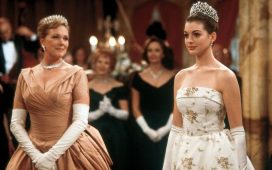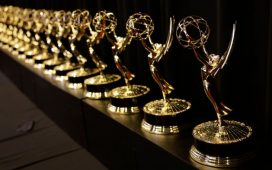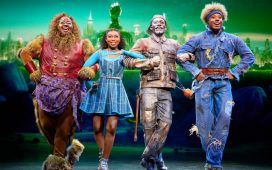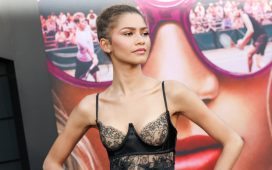Going into the 2021 Emmys, there were a few obvious favorites. By the time Cedric the Entertainer opened the show on Sept. 19, Apple TV Plus’ “Ted Lasso” and Netflix’s “The Crown” had seemed like locks for best comedy and drama for weeks, if not months. The extent they would go on to sweep their respective categories, though, was startling. Throw in a convincing showing from HBO’s “Mare of Easttown,” which won in three of the four limited series acting categories before Netflix’s “The Queen’s Gambit” won the ultimate prize, and this year’s Emmys felt dominated by fewer shows than ever.
Here, Variety’s chief TV critics Caroline Framke and Daniel D’Addario discuss the winners and the show at large.
Caroline Framke: When turning on the Emmys, I was curious to see just how “normal” the ceremony might look one year after Jimmy Kimmel faced an enormous wall of Zoom screens to say hello to all the nominees. All told, the adjustments this year’s show made to both return to a status quo and take some calculated format risks made for a surprisingly straightforward show.
Seating nominees at different tables, ostensibly a social distancing measure, lent a slightly more spontaneous, Golden Globes-esque vibe to the proceedings. And as Seth Rogen pointed out early on, the “tent” in which they were all sitting looked enough like a closed room that it probably could’ve been without raising more eyebrows. Even “The Crown” team beaming in from a London bar in the dead of night felt about right, all things considered. Probably most successful was the choice to mix up the run of show — not least because, as we’ll have to discuss, a few shows ended up dominating to the point that keeping all their categories together would have made for an even more monotonous evening.
What did you make of how the Emmys unfolded, Dan?
Daniel D’Addario: I think the producers did the best they could with every aspect they could control — the setting and the in-person participation, likely a logistical nightmare to execute, came off well enough. Unfortunately, there were elements that production couldn’t address: A stream of winners from only a few shows seemed to contribute to what was by the end a somewhat sour mood in the room — not helped by overlong and somewhat graceless speeches, including an eyebrow-raising show closer by “The Queen’s Gambit” EP William Horberg, in which he credited Anya Taylor-Joy with bringing “the sexy back to chess” while also fighting patriarchy — in the same sentence.
At least, as you say, Caroline, the run of show led to some suspense, with “Gambit” vs. “Mare of Easttown” among the show’s few unsettled questions. (The pleasant surprise of paired writing and directing wins for “Hacks” in the comedy field couldn’t, in the end, disrupt “Ted Lasso’s” march to glory.) In the end, the Emmys split the difference, giving “Gambit” the top limited series prize but honoring “Mare” actors in every category in which they were nominated. Similar sweeps or near-sweeps for “Lasso” (in three of four acting categories) and “The Crown” (in all four) made the show feel mired in a sort of toxic sameness.
Among these gluts of wins for just a few shows were some very worthy choices. I’m, for instance, a huge admirer of all three “Mare of Easttown” winners — Kate Winslet, Evan Peters, and Julianne Nicholson. But, especially after last year’s “Schitt’s Creek” domination, the Emmys are going through an era where adventurousness only goes so far, picking a few accomplished shows and singling them out not just as the best of TV, but the only thing on TV. It’s hard to believe that the Emmys were more spread-around before the wild openness of the streaming era.
Framke: I feel much the same way about the “Lasso” and “Crown” acting wins. I genuinely loved those actors’ performances (with the exception of Gillian Anderson’s creaky Margaret Thatcher, though I know I’m in the minority on that one). I’m very glad they were nominated and can’t technically fault their wins. But for the Emmys to look back on this year in TV and award 10 of 12 acting wins to three shows seems not just strange, but out of touch.
In some respects, I really do sympathize with the issue that may be at the heart of this recent tendency to double down on a few favorites. In the face of Too Much TV, many Emmy voters are clearly exhausted by the sheer volume of choice and are content to vote for shows they’ve already seen and liked. The fact of the matter is, though, that considering as many shows as possible and giving every nominee a fair shot is what being an Emmy voter should mean. That’s the job! And yet here we are, talking about a paltry handful of shows when so many more were nominated and deserved at least a slice of the action.
“Ted Lasso” and “Mare of Easttown” splitting many of their respective genre’s honors is notable, though as you say, at least a couple spoilers snuck their way in regardless. It was wonderful to see “Hacks” creators Paul W. Downs, Jen Statsky and Lucia Aniello take to the stage with gobsmacked awe, and a downright relief when Michaela Coel managed to break up the “Mare” and “Queen’s Gambit” limited series runs by winning for writing. Drama, however, had no such reprieve. The fourth season of “The Crown” was a delicious melodrama, but it sweeping every single drama category is just unthinkably boring.
D’Addario: Indeed — a juicy, ripping soap ended up feeling, by broadcast’s end, like a default option. That’s unfair to “The Crown,” as it lends the sense that voters are just checking a familiar name, even as it really was at or near the very top of the field regardless. The Emmys have gotten flack over the years for a lack of imagination, with repeat champs like “Modern Family” and “Frasier”; even in choosing a bunch of first-timers, the awards this year ended up seeming automatic.
I do at least share your excitement about those spoiler wins: in particular, the honors for “Hacks” delighted me, because it’s the sort of show that unfussily makes what it does look easy. And Coel’s speech, an elegant tribute to the old-fashioned power of writing one’s way through trauma and through the cacophony of life in the internet age, was a moment of real power of the sort no one can predict before it happens.
Coel’s gifts are one of a kind. But Emmy voters would be well-advised to notice how her speech stood out and ask themselves what it costs the relevance of their voting body when things break the exact same way, prize after prize. If the message the Emmys sent was that there are only a few shows worth caring about, ancillary to that is the idea that if you don’t, this isn’t the awards show for you. TV in 2021 is messy and noisy and big — in good ways and bad — and there are options for everyone. Notably, this means the medium is also increasingly inclusive, a fact reflected in the show’s presenters and its nominees, but certainly not its slate of winners. The choices the Emmy voters made had the effect of making the medium seem narrow.








